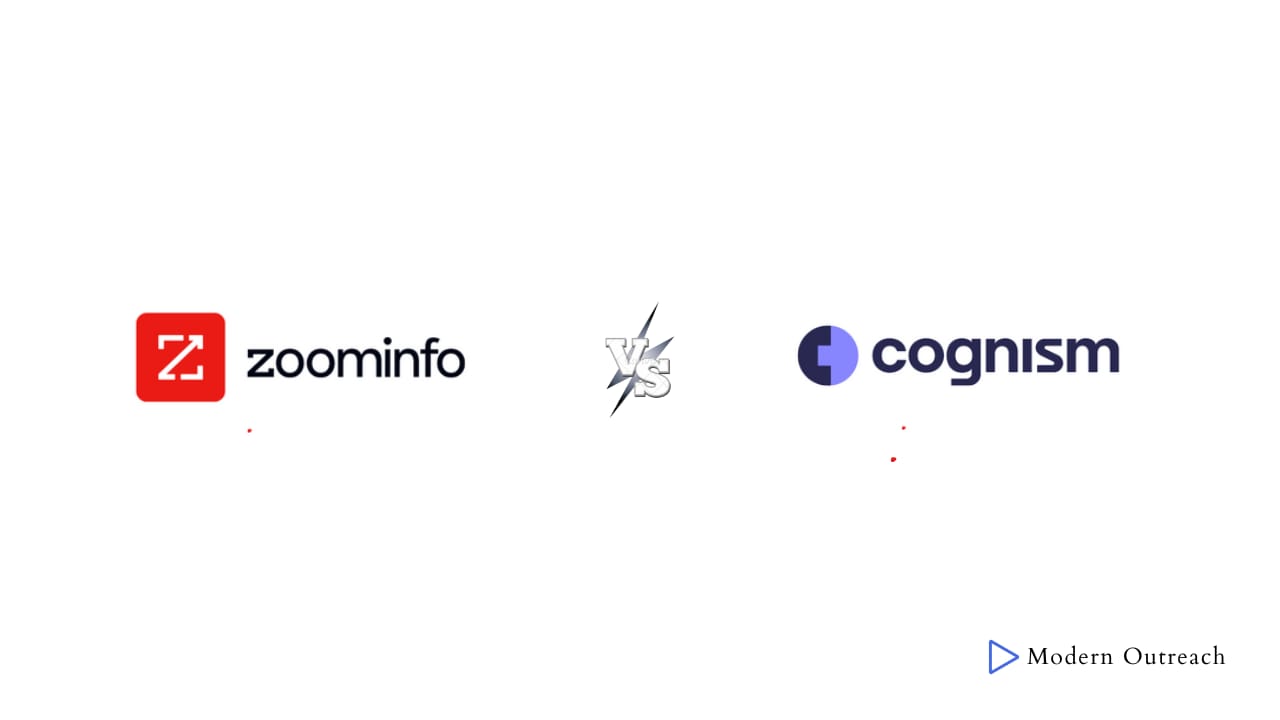In today’s data-driven sales landscape, sales and marketing teams rely on cutting-edge tools to optimize lead generation, enhance prospecting efforts, and achieve revenue goals.
ZoomInfo and Cognism are two prominent players in the sales intelligence market, offering robust solutions to empower teams with actionable insights. Both platforms help businesses identify, target, and engage leads effectively, but their strengths lie in different areas.
While ZoomInfo excels with its extensive database and intent signals, Cognism stands out for its GDPR-compliant, human-verified data, making it ideal for businesses operating in regulated markets like the EU.
Choosing the right platform depends on your organization’s specific needs, including database size, data accuracy, compliance requirements, and budget.
In this article, we’ll compare ZoomInfo vs Cognism across features, pricing, usability, and real-world applications to help you make an informed decision. Whether you’re a growing business or an established enterprise, this guide will ensure you select the tool that best aligns with your goals.
Understanding Your Options
Before we dive into the in-depth comparison, let’s take a closer look at what each platform has to offer.
ZoomInfo: An Overview
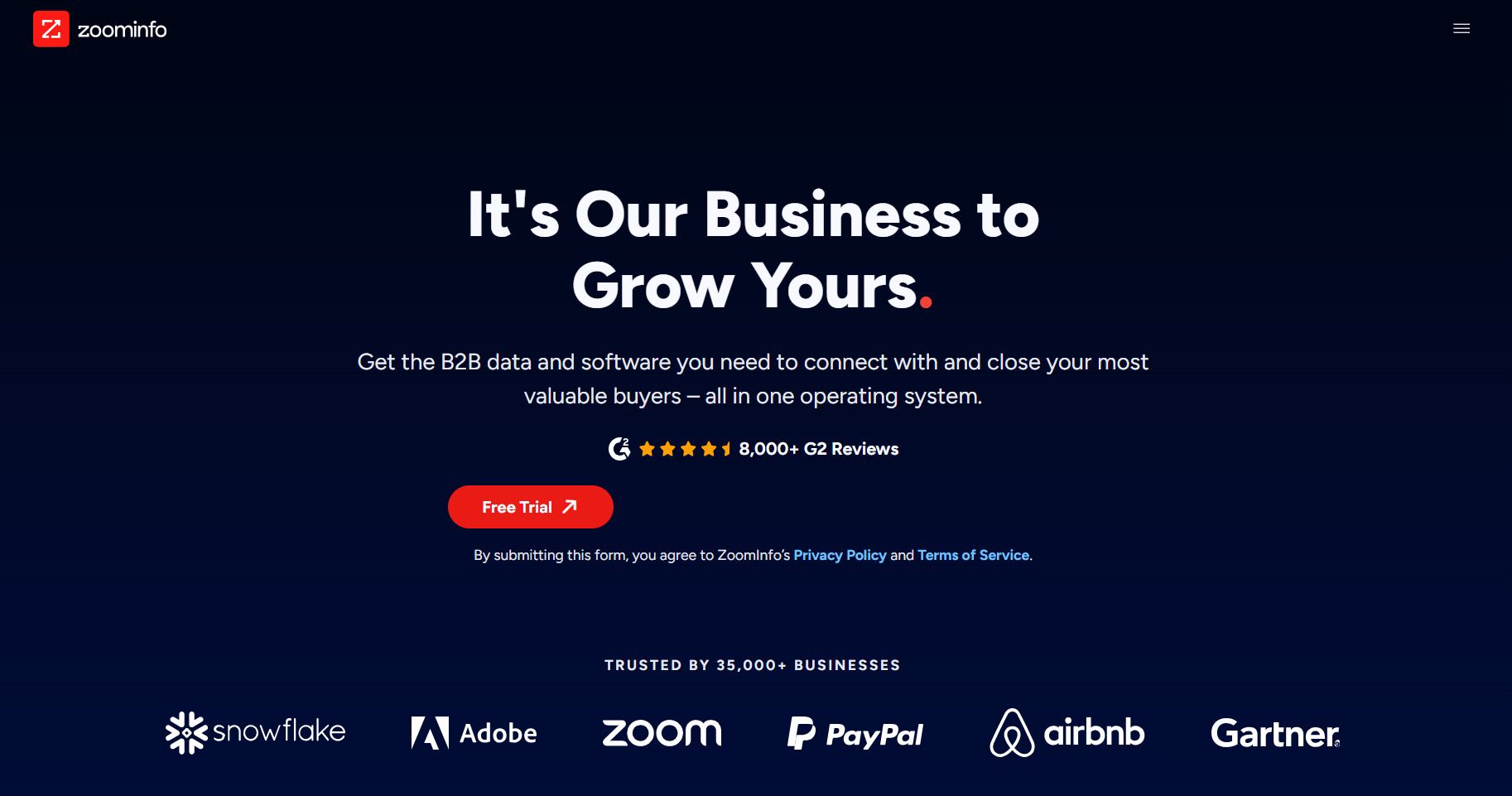
ZoomInfo is a leading sales intelligence platform designed to empower B2B teams with extensive contact and company data. Known for its robust database and precise intent tracking, ZoomInfo excels in helping businesses identify and connect with high-value prospects. The platform is especially popular among organizations that prioritize detailed outreach and data-driven sales strategies.
Main Audience: B2B sales professionals, enterprise marketers, and recruitment teams.
Primary Features: Comprehensive contact database, firmographic and technographic insights, intent data, and seamless CRM integrations.
Cognism: An Overview

Cognism stands out for its human-verified, GDPR-compliant data, making it a preferred choice for businesses operating in regions with strict data privacy regulations, like Europe. Its focus on high-quality data, combined with advanced sales prospecting tools, ensures that users can connect with the right contacts while maintaining compliance.
Main Audience: Companies targeting global markets, particularly in the EU, and those prioritizing compliance.
Primary Features: GDPR-compliant data, human-verified contacts, sales prospecting tools, and lead enrichment.
Main Differences Between ZoomInfo vs Cognism:
Overview-
Here is the overview difference table of ZoomInfo vs Cognism -
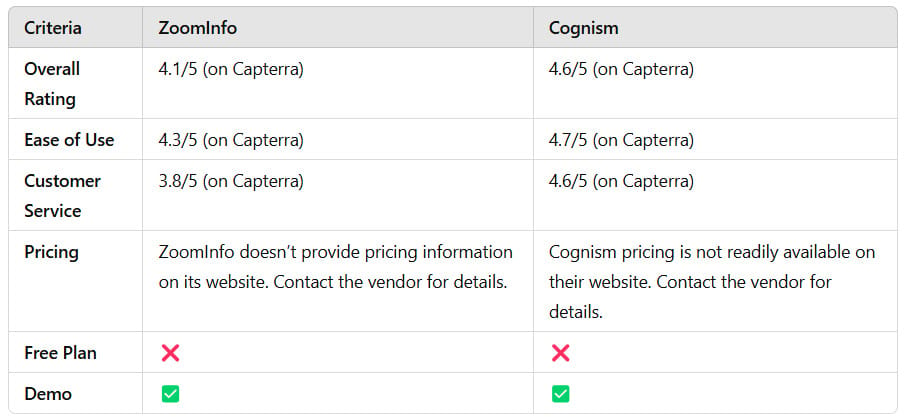
Core Features and Functionality: ZoomInfo vs Cognism
ZoomInfo: Unlocking Sales Intelligence with a Vast Database
ZoomInfo excels in providing comprehensive sales and marketing data, empowering businesses with tools for lead generation and prospecting.
Key Features of ZoomInfo:
Contact and Company Database: Access an extensive database of professionals and companies, including detailed information like job roles, email addresses, and phone numbers.
Intent Data: Track intent signals, such as online behavior, to identify prospects showing buying interest.
Advanced Filtering Options: Easily segment prospects by industry, location, company size, or revenue.
Sales Engagement Tools: Features like Workflows and Engage streamline lead nurturing and outreach.
Data Enrichment: Keep your CRM updated with the latest contact details and company information.
CRM and Marketing Integrations: Seamlessly integrates with tools like Salesforce, HubSpot, Outreach, and Microsoft Dynamics.
Revenue Tracking: Offers insights into which leads convert to revenue, enabling better resource allocation.
Cognism: Intent and Compliance-Focused Lead Generation
Cognism specializes in GDPR-compliant B2B prospecting, combining intent data with advanced sales automation to support outbound teams.
Key Features of Cognism:
Global Data Coverage: Provides accurate contact information for prospects across multiple regions, ensuring compliance with data privacy regulations.
Intent and Engagement Insights: Uses advanced tracking to determine when prospects are ready to engage.
Sales Automation: Streamline outreach with automation tools like email templates and sequence management.
Revenue AI: Identifies high-value prospects using predictive analytics and machine learning.
Account-Based Marketing (ABM): Supports personalized campaigns targeted at key accounts.
Multi-Channel Outreach: Enable outreach through email, phone, and LinkedIn from a single platform.
Compliance and Data Security: Ensures data privacy standards like GDPR are met, critical for businesses in regulated markets.
Seamless Integrations: Works with CRMs like Salesforce and marketing platforms to provide end-to-end sales insights.
Key Differentiators:
ZoomInfo provides a larger database and is better suited for companies prioritizing mass lead generation.
Cognism excels in GDPR compliance, intent-based targeting, and sales automation, making it ideal for regulated industries and outbound sales teams.
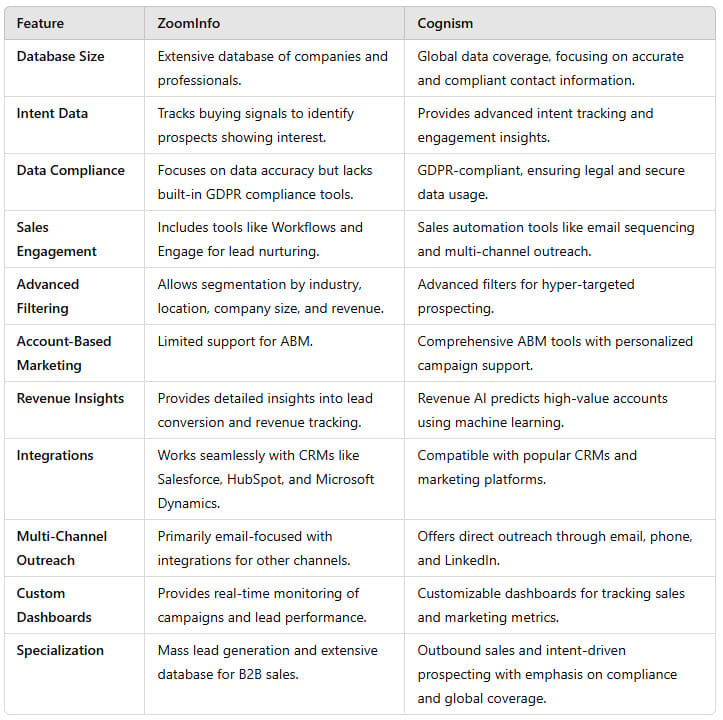
Pricing Comparison of ZoomInfo vs Cognism
Pricing is a crucial factor for businesses evaluating sales and marketing intelligence tools. Here's a breakdown of how ZoomInfo and Cognism structure their pricing:
ZoomInfo Pricing
Pricing Structure: ZoomInfo follows a custom pricing model. The cost varies based on data requirements, the number of users, and additional features needed.
Best For: Enterprise-level teams and businesses needing extensive contact databases and robust sales intelligence tools.
Free Trial: Offers limited demos to showcase platform capabilities.
Cognism Pricing
Pricing Structure: Similar to ZoomInfo, Cognism operates on a custom pricing model. Businesses must contact the sales team to receive a quote tailored to their specific requirements.
Best For: Teams prioritizing GDPR-compliant, globally accurate B2B data and intent-driven sales prospecting.
Free Trial: No free trial, but Cognism provides a demo to explore its features and functionalities.
Summary
Both ZoomInfo and Cognism use custom pricing models, making it essential for businesses to communicate their specific needs to receive accurate quotes.
User Interface and Experience
The ease of use is critical, especially for sales teams that need to onboard quickly.
Here's the user rating from G2, which shows the usability of both ZoomInfo vs Cognism from the actual users...
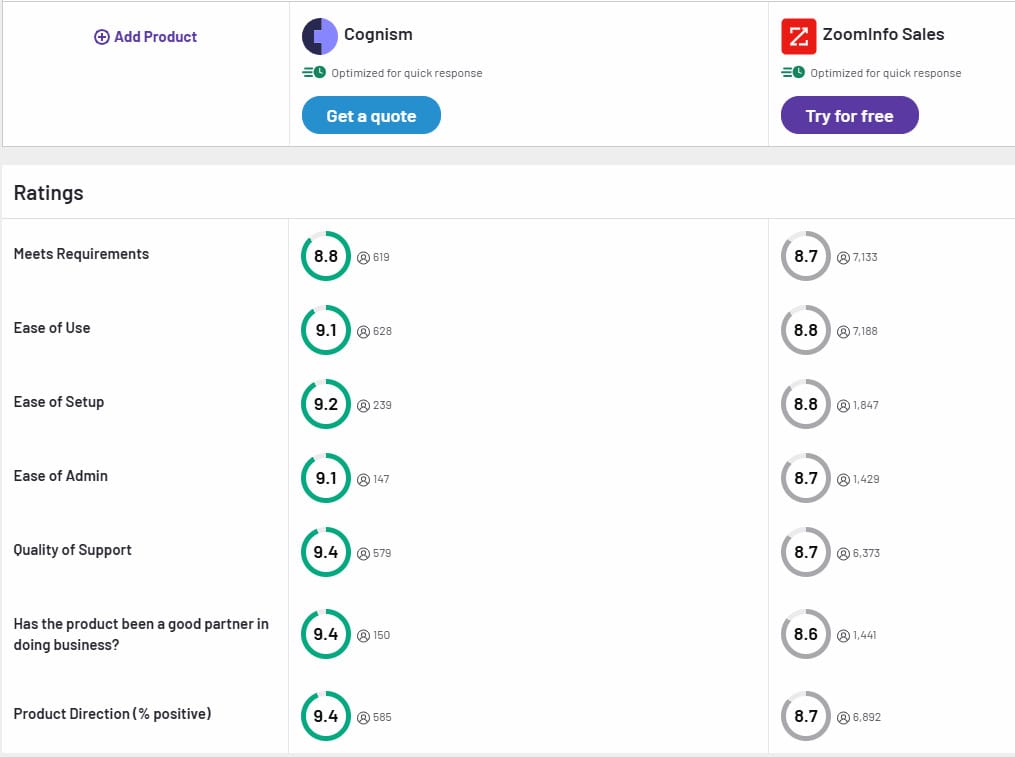
Pros and Cons of ZoomInfo vs Cognism
ZoomInfo
Pros:
Extensive Database: Offers a vast collection of company and contact information, making it ideal for precise B2B targeting.
Buyer Intent Data: Tracks prospect behavior to identify leads actively researching relevant products or services.
Advanced Filtering: Enables segmentation by multiple criteria such as industry, location, and company size for refined targeting.
CRM Integrations: Seamlessly connects with platforms like Salesforce and HubSpot, enhancing workflow efficiency.
Cons:
High Pricing: The cost can be prohibitive for startups or smaller businesses.
No GDPR Compliance Guarantee: While extensive, the data might not fully adhere to global compliance standards.
Best For: Large enterprises and sales teams seeking a powerful database for high-level targeting and lead generation.
Cognism
Pros:
GDPR Compliance: Specializes in providing globally compliant data, making it ideal for businesses with strict data privacy requirements.
Intent Data: Identifies active buyers using predictive insights to enhance conversion rates.
Global Data Accuracy: Offers reliable contact information for international markets.
User-Friendly Interface: Designed with usability in mind, reducing the learning curve for new users.
Cons:
Limited Database Size: Smaller compared to ZoomInfo, potentially impacting larger-scale campaigns.
No Free Plan: Lacks a free plan, which may deter smaller businesses.
Best For: Companies focused on GDPR compliance and international markets, especially those needing intent-driven prospecting.

Summary
Choose ZoomInfo if your primary need is access to a massive database and robust filtering options for precise targeting.
Choose Cognism if you prioritize GDPR-compliant data and reliable global insights to support your marketing strategies.
Which Tool Should You Choose?
Both ZoomInfo and Cognism offer exceptional features but are designed to meet the needs of different business types. Here’s my recommendation:
Choose ZoomInfo if: You’re a large enterprise or sales team that requires a massive database of accurate B2B contact information, advanced filtering options, and seamless CRM integrations for precise targeting and lead generation.
Choose Cognism if: You’re focused on global markets and need GDPR-compliant data, intent-driven prospecting capabilities, and a user-friendly platform to ensure efficient workflows and legal compliance.
Frequently Asked Questions (FAQs): ZoomInfo vs Cognism
What is the main difference between ZoomInfo and Cognism?
The key difference between ZoomInfo and Cognism is in their data offerings and target audience. ZoomInfo is ideal for larger enterprises, offering an extensive database of accurate B2B contact information, advanced filtering options, and a wide range of insights. Cognism, on the other hand, is tailored for businesses looking for GDPR-compliant data with a focus on global outreach, intent-driven prospecting, and easy-to-use tools for efficient sales engagement.
Is Cognism cheaper than ZoomInfo?
Yes, Cognism is generally more affordable than ZoomInfo. Cognism offers a straightforward pricing structure, while ZoomInfo uses a custom pricing model, which can often result in higher costs. Cognism’s pricing is more suited to SMBs and mid-market businesses with budget considerations.
Which tool offers better data accuracy: ZoomInfo or Cognism?
ZoomInfo is known for its high-quality, verified data and is widely regarded as offering superior accuracy, especially for North American markets. Cognism also provides accurate data but places a heavier emphasis on compliance with data protection regulations like GDPR, making it a better choice for businesses operating globally.
Does Cognism provide a free trial?
Cognism does not offer a free trial, but potential users can request a demo to explore its features. ZoomInfo also doesn’t provide a standard free trial but offers demos upon request.
Can I use Cognism for email marketing?
Yes, Cognism offers built-in email sequencing features, allowing users to automate outreach campaigns. It helps sales teams engage with prospects at scale, streamlining the email marketing process.
Which types of businesses are best suited for ZoomInfo?
ZoomInfo is best suited for large enterprises and sales teams that require an extensive database of reliable contact and company data. It’s particularly beneficial for businesses that rely on high-quality data for detailed prospecting and complex lead-generation strategies.
How does Cognism integrate with other tools?
Cognism integrates seamlessly with popular CRM systems such as Salesforce, HubSpot, and Outreach, allowing users to efficiently manage their leads and sales processes within their existing workflows.
Wrapping Up and Next Steps
The decision between ZoomInfo and Cognism largely depends on your business size, budget, and specific needs.
Choose ZoomInfo if you need comprehensive, accurate data for precise targeting and in-depth prospecting, especially if you're a larger enterprise.
Choose Cognism if you’re a mid-sized business looking for cost-effective, GDPR-compliant data with a focus on global reach and intent-driven prospecting.
Still unsure? Consider requesting a ZoomInfo demo to explore its capabilities or get started with Cognism’s demo to see how it fits with your sales needs.
Explore More:

